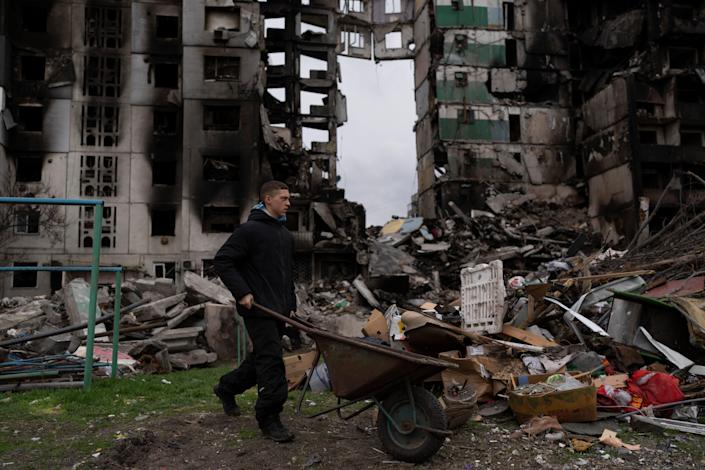It is said that power corrupts. It also blinds. Has Vladimir Putin stumbled into a Churchillian moment of becoming yet another who has either misread or failed “to learn from history” and is therefore “doomed to repeat it”?
Allow me to share some personal and professional perspectives beginning with a stint in which I reported for The Economist from Tehran, during the “Iranian Hostage Crisis” in 1979.
Being the only American reporter in Iran who could speak Farsi, I was able to develop contacts with people who revealed to me not only the date (Inauguration Day 1981) when the hostages would be released, but also information regarding the virtually concurrent invasion, on December 24, 1979, of Afghanistan by the Soviet Union.
Former U.S. Ambassador Michael McFaul, according to Newsweek reporter Jason Lemon, has predicted “Putin’s decision would ultimately be seen as his downfall.”
However, possibly more telling than that prediction was his revealing to MSNBC recently that he had seen numerous videos of captured Russian soldiers befuddled by the unexpected reception they encountered on the battlefield.
So, too, I was told back in 1979 that the Soviet soldiers had been surprised by the resistance that they had not been warned to expect in Afghanistan. Just as telling was this reported quote by a Russian soldier invading Ukraine: “We don’t know who to shoot. They all look like us!”
Hear more Tennessee Voices: Get the weekly opinion newsletter for insightful and thought provoking columns.
Lessons we can learn from the Iranian Revolution
I lived in Iran for seven years prior to reporting on it and I followed developments there particularly closely in 1978 and early 1979 when, on January 16, the Shah, who had ruled with an iron fist, was forced to flee the country.


The undoing of his regime and what significantly began to seal his fate was when, in the fall of 1978, soldiers began to join and protest rather than put down the citizen protests. What follows the downfall of an autocrat or a dictator is not guaranteed to be better, as was demonstrated by the Iranian Revolution, but it can be positive.
It behooves us to pay close attention to those brave Russian souls who are taking to the streets of so many Russian cities to protest the war with their brothers and sisters in Ukraine.
The offensive into the brotherland appears to be revealing that the current, unfortunately sad state of warfare, can lead, ultimately, to fortunate outcomes. More importantly, the misfortune to Ukraine of NATO’s lack of direct military involvement, happens to be fortunate.
Sign up for Latino Tennessee Voices newsletter: Read compelling stories for and with the Latino community in Tennessee.
Why Ukraine must be the only aggrieved party
Allow me to explain, notwithstanding how much it pains me to think of the suffering and burden placed on so many brave Ukrainians.
It is crucially important that the aggrieved party in this conflict just be Ukraine! So long as the Russian homeland is not attacked, the whole world — with the exception of a few rogue states, but including a growing number of Russian citizens — will oppose Putin’s miscalculated invasion.
Take Kazakhstan, for example, which refused Putin’s initial request to send troops to the battlefront.
Frankly, whether Russia overpowered Ukrainian resistance, by overrunning Kyiv and contending to “control” the country, was irrelevant — except to Ukrainians — in the short run.
The psychological battle seems already to have been lost by the Russians. So, if Kyiv falls, Putin will find himself with a months-to-years-long insurgency on his hands, definitely not a victory.
Reference the Soviets being bogged down in Afghanistan from Dec. 24, 1979 to their eventual withdrawal on February 15, 1989 — and the subsequent dissolution of the Soviet Union on December 25, 1991 (Christmas Day)!
Sign up for Black Tennessee Voices newsletter: Read compelling columns by Black writers from across Tennessee.


Your state. Your stories. Support more reporting like this.
A subscription gives you unlimited access to stories across Tennessee that make a difference in your life and the lives of those around you. Click here to become a subscriber.
The pressure is getting to Russian leaders
Couple an unending Ukrainian insurgency with the accompanying Russian isolation — particularly economic isolation — from the rest of the world and it will only be a matter of time — granted possibly a relatively long time — before Russian citizens or the currently corrupt coterie surrounding Putin will have had enough and find a way to dethrone him.


For starters, look no further than the resentment of those hither-to yes men “leaders” who attended the end-of-February Security Council meeting in which Putin openly chastised them, particularly the director of foreign intelligence, Sergey Naryshkin, whom he publicly humiliated on national television.
Think economic sanctions can’t work? Welcome to Iran’s world. When I lived in Tehran in 1965, a U.S. Dollar was exchanged for around 75 rials. Today, if one can find a way to exchange it, the rate is 42,200.70 rials per a single dollar.
Steve Manis has lived in or traveled through more than 160 countries and has reported on several of them. He visited Prague two months before the Soviet invasion of Czechoslovakia in August of 1968 and the year before, on a trip to Moscow, he obtained a Russian soldier’s hat and several Russian anti-War (Vietnam) posters. His father was a University of Tennessee professor who was involved in the famed civil rights-focused Highlander Folk School in Monteagle and passed that advocacy to his progeny.
This article originally appeared on Nashville Tennessean: Ukraine war: Putin fails to heed the lessons of Iran and Afghanistan




